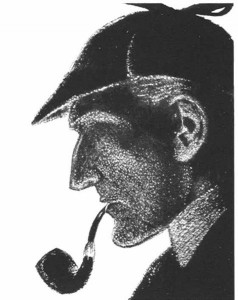 It shouldn’t take a detective to realize that Sherlock Holmes is in the public domain by now, but apparently it takes a court to declare it.
It shouldn’t take a detective to realize that Sherlock Holmes is in the public domain by now, but apparently it takes a court to declare it.
We’ve covered the matter a couple of times. The Conan Doyle estate trademarked Holmes in the hope that could prevent others from using him without paying a licensing fee. A couple of years ago, the New York Times pointed out that some of the rights to Holmes are in kind of a twisted tangle.
But now a federal judge has issued a decision affirming that the characters and situations from all the Sherlock Holmes canon, save for the last story collection published after 1923, are definitely in the public domain within the USA and can be used by creators without paying licensing fees. Characters and situations from the last book are still off limits. (But then, that book is not generally considered to be Conan Doyle’s best work anyway.)
Chief Judge Rubén Castillo of the United States District Court of the Northern District of Illinois, Eastern Division, rejected the estate’s claim that the characters and the basic Holmes story line themselves remain under copyright, since they were not truly completed until Conan Doyle stopped writing. The judge did caution, however, that elements introduced in the 10 stories published after 1923 — such as the fact that Watson played rugby for Blackheath — remain protected.
The ruling was in response to a complaint filed by Leslie S. Klinger, the editor of a collected, annotated Holmes set and a number of other books about the detective. His publisher had declined to move forward with an anthology of new Holmes stories after the Conan Doyle estate said it would prevent the book from being sold unless Klinger paid a licensing fee.
The Conan Doyle estate may appeal, and insists that this does not affect any existing licensing agreements or its trademark claims. (I had thought there was some law saying that trademark claims couldn’t be applied against uses of public domain characters, but I can’t seem to find it now.)

































Chris, here’s a link to a lawyer’s article on trademarking literary and graphic characters that may be what you are thinking about.
http://www.trademarkandcopyrightlawblog.com/2013/03/superheroes-of-copyright-when-do-fictional-characters-enjoy-copyright-protection/
I wonder now if the folks who made the recent Sherlock Holmes movies, with Robert Downey as Sherlock, paid a licensing fee to the Doyle estate and whether they will pay in the future.
My observation is that publishers, movie producers and others operating at that level routinely pay fees that might not be owed due to lapsed copyright (e.g. the song, “Happy Birthday”). The motive? Perhaps they think it ‘s cheaper than arguing in court and, sadly, they may be right.
@Frank, you are correct, which is one of the reasons rights holders take legal action. The company my husband works for was sued a while back for patent infringement, by a patent troll. They had sued other companies, who had chosen to pay the fees. The company my husband works for chose to fight it, and the legal fees were horrendous. Of course, by that point, the troll had inflated the licensing fee to more than the cost of the software package, so fighting it was the only way to keep the company in business.
It’s left a bad taste in my mouth for such suits and abuse of copyright and patents.
I’m delighted by this news, but I shudder at the thought of all the tales of “Sherlock Holmes, Vampire Hunter” and “Sherlock Holmes meets Dracula” we’ll soon have to endure.
Of course, if you want to write such tales, don’t let me stop you. Just do a good job and get the period and writing style right.
–Michael W. Perry, Untangling Tolkien
@Michael, I hate to tell you this, but those stories already exist…
Maybe now Sherlock Homles can now have monster sex with a yeti in The Adventure of the Buggering Beast.
@Greg, I might consider reading that. 😉